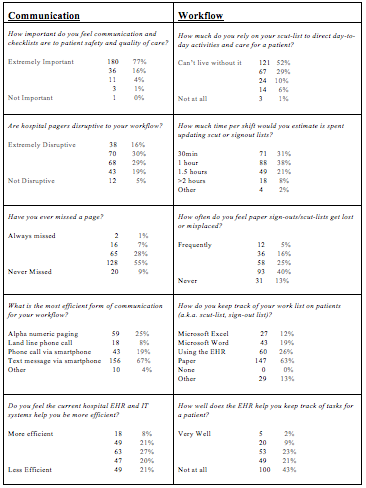Background: Academic medical centers are complex healthcare delivery systems that are quickly adopting electronic health records (EHR) nationwide while still using alpha-numeric paging for physicians-in-training raised with cell phones, texting, messaging, and newer technologies. Understanding workflow processes for these providers of patient care are key to finding solutions to improve healthcare quality and safety.
Methods: To understand how residents carry out their tasks for patient care in academic medical centers and their views on current processes, we conducted an 18-question survey of 232 residents from 4 academic medical centers on their current communication and workflow processes regarding daily patient care in the era of EHR adoption. Survey questions were developed by two board certified attending physicians with expertise in Clinical Informatics. Likert scales and other measures were used for evaluation. Link to survey was disseminated to residents via email. Participation was voluntary.
Results: Response rate was 32%. We discovered that almost all residents surveyed believe communication and checklists are important to patient safety and quality of care. On communicating, we found that almost half of residents found paging extremely disruptive, almost all at some point have missed a page, and while some believe that paging is the most efficient form of communicating, most believe text messaging via a smart phone is the most efficient form given their workflow. On evaluating workflow processes, the vast majority of physicians surveyed felt their task management (a.k.a., “scut”) list is an extremely valuable tool they cannot live without, despite these lists primarily being paper-based, easy to lose or misplace, and require at least an hour updating throughout the day. The majority of those surveyed feel that current hospital EHR and IT systems do not make them more efficient, and only 11% believed their EHRs kept track of tasks for their patients (Table).
Conclusions: Physicians-in-training at academic medical centers are providing daily patient care in a complex healthcare delivery system where the current state of communication, task management, EHR, and IT systems can be disruptive, prone to error, and not conducive to or efficient for their workflow in providing patient care. This study suggests that potential future solutions should target such areas as bidirectional provider communication and task management, with a focus on optimizing efficiency and patient safety.
